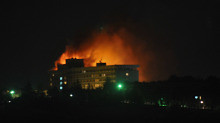
Kabul, Afghanistan hotel was attacked on June 29, 2011. Several people were killed in the building that houses many NATO country personnel that are now occupying the Central Asian nation., a photo by Pan-African News Wire File Photos on Flickr.
latimes.com/news/nationworld/world/la-fg-afghan-hotel-attack-20110629,0,7425121.story
Attackers kill as many as 6 at landmark Afghan hotel
Gunmen and suicide bombers strike the tightly secured Intercontinental Hotel in Kabul, which has a large foreign clientele. The attackers are also killed.
By Laura King, Los Angeles Times
June 29, 2011
Reporting from Kabul, Afghanistan
A team of gunmen and suicide bombers struck a landmark hotel in the Afghan capital Tuesday evening, police said, killing up to six people in the hotel and setting off an hours-long battle that ended only after NATO helicopters swooped in to help.
It was the latest — and by far the most dramatic — in a series of attacks that have underscored the insurgents' ability to penetrate even Kabul's most heavily guarded installations, raising troubling new questions about the Afghan forces' ability to take over responsibility for safeguarding the country.
The sound of gunfire and explosions echoed until nearly dawn across the city's western edge, where the Intercontinental Hotel perches on a hilltop, visible from a considerable distance. It is approached by a winding road punctuated by police checkpoints.
The Taliban claimed responsibility for the unusual nighttime strike on the hotel, which has a large foreign clientele and is frequently a venue for official conferences and events.
No information was released about the six victims.
At any given time, high-ranking Afghan officials from outside the capital can be found there, and news reports said at least one provincial governor was present at the time of the attack.
In Washington, the State Department said special regional envoy Marc Grossman had departed the capital before the attack began. Spokeswoman Victoria Nuland condemned the attackers' "complete disregard for human life."
In Kabul, the head of criminal investigation for the police, Gen. Mohammed Zahir, said that as many as six attackers managed to make their way into the hotel, and at least one was thought to have detonated an explosives-laden vest. All the attackers were killed.
Police sealed off streets leading to the scene, and helicopters could be heard overhead. The five-story building was plunged into darkness as either the attackers or the authorities cut off power. Some patrons had been dining in the hotel restaurant when the attack began, said witnesses quoted by Afghan media.
A spokesman for NATO's International Security Assistance Force said coalition helicopters brought an end to the siege by firing on the last of the attackers, who had made their way to the roof of the structure.
Kabul has only a few four- and five-star hotels, and all are tightly secured. A luxury hotel popular with foreigners, the Serena, was the target of a 2008 strike that left eight people dead.
The Intercontinental, which opened in the late 1960s, has mirrored Kabul's fortunes. It was a symbol of the cosmopolitan lifestyle that briefly flourished in the Afghan capital in the 1970s, and then was battered by fighting during the civil war in the early to mid-1990s.
After the Taliban takeover in 1996, the fundamentalist movement targeted its still-considerable liquor stocks. Following the U.S.-led invasion that toppled the Taliban, foreign journalists were its primary customers. The hallways reeked because of the lack of running water in most rooms.
Although shabbier now than in its heyday, the hotel still draws mostly expatriates and the Afghan elite. International groups have sometimes used it as a headquarters.
Insurgents have stepped up a campaign of violence before a planned transfer of seven areas around the country from Western to Afghan security control.
laura.king@latimes.com
Special correspondent Hashmat Baktash contributed to this report.
No comments:
Post a Comment